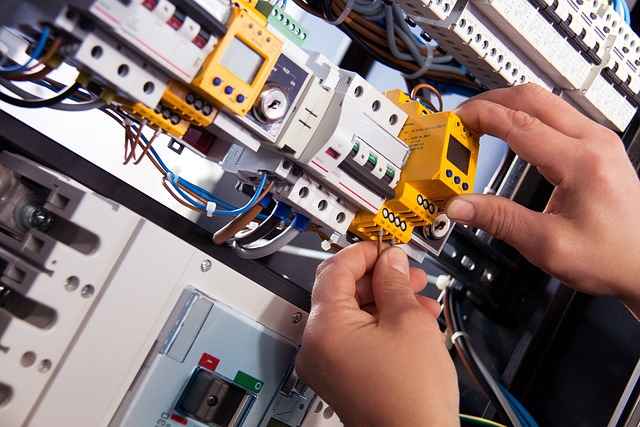
Electricians
Published on
Average Read time: 1 minute 57 seconds
Electricians are skilled professionals responsible for installing, maintaining, and repairing electrical systems in various settings, including residential, commercial, and industrial buildings. Here are some key responsibilities and tasks of an electrician:
Installation of Electrical Systems: Electricians install wiring, conduits, electrical outlets, switches, lighting fixtures, circuit breakers, and other components of electrical systems in new construction projects or during renovations.
Electrical Repairs: Electricians troubleshoot electrical problems and perform repairs to restore functionality and safety. This may involve diagnosing issues with wiring, outlets, switches, lighting fixtures, circuit breakers, or appliances.
Maintenance of Electrical Systems: Electricians conduct routine maintenance to ensure that electrical systems operate efficiently and safely. This includes inspecting wiring, checking for signs of wear or damage, and performing preventive maintenance tasks.
Upgrading Electrical Systems: Electricians upgrade electrical systems to meet the changing needs of clients or to comply with updated building codes and regulations. This may involve replacing outdated wiring, upgrading electrical panels, or installing additional outlets or circuits.
Electrical Safety Inspections: Electricians conduct safety inspections of electrical systems to identify potential hazards, code violations, or safety concerns. They may recommend and implement corrective actions to address issues and ensure compliance with safety standards.
Installation of Electrical Appliances and Equipment: Electricians install electrical appliances, equipment, and systems such as HVAC systems, generators, security systems, fire alarm systems, and data networks.
Specialized Electrical Work: Some electricians specialize in specific areas of electrical work, such as low-voltage systems (e.g., telecommunications, audiovisual systems), renewable energy systems (e.g., solar panels, wind turbines), or industrial machinery.
Emergency Services: Electricians provide emergency electrical services to address urgent issues such as power outages, electrical fires, or electrical hazards. They respond quickly to restore power and ensure the safety of occupants.
Compliance with Codes and Regulations: Electricians adhere to electrical codes, regulations, and safety standards established by national, state, and local authorities. They ensure that electrical work is performed safely, accurately, and in compliance with applicable requirements.
Continuing Education and Training: Electricians participate in continuing education programs and training workshops to stay updated on electrical codes, industry trends, new technologies, and safety practices. This helps them maintain their skills and knowledge and provide high-quality services to clients.
Installation of Electrical Systems: Electricians install wiring, conduits, electrical outlets, switches, lighting fixtures, circuit breakers, and other components of electrical systems in new construction projects or during renovations.
Electrical Repairs: Electricians troubleshoot electrical problems and perform repairs to restore functionality and safety. This may involve diagnosing issues with wiring, outlets, switches, lighting fixtures, circuit breakers, or appliances.
Maintenance of Electrical Systems: Electricians conduct routine maintenance to ensure that electrical systems operate efficiently and safely. This includes inspecting wiring, checking for signs of wear or damage, and performing preventive maintenance tasks.
Upgrading Electrical Systems: Electricians upgrade electrical systems to meet the changing needs of clients or to comply with updated building codes and regulations. This may involve replacing outdated wiring, upgrading electrical panels, or installing additional outlets or circuits.
Electrical Safety Inspections: Electricians conduct safety inspections of electrical systems to identify potential hazards, code violations, or safety concerns. They may recommend and implement corrective actions to address issues and ensure compliance with safety standards.
Installation of Electrical Appliances and Equipment: Electricians install electrical appliances, equipment, and systems such as HVAC systems, generators, security systems, fire alarm systems, and data networks.
Specialized Electrical Work: Some electricians specialize in specific areas of electrical work, such as low-voltage systems (e.g., telecommunications, audiovisual systems), renewable energy systems (e.g., solar panels, wind turbines), or industrial machinery.
Emergency Services: Electricians provide emergency electrical services to address urgent issues such as power outages, electrical fires, or electrical hazards. They respond quickly to restore power and ensure the safety of occupants.
Compliance with Codes and Regulations: Electricians adhere to electrical codes, regulations, and safety standards established by national, state, and local authorities. They ensure that electrical work is performed safely, accurately, and in compliance with applicable requirements.
Continuing Education and Training: Electricians participate in continuing education programs and training workshops to stay updated on electrical codes, industry trends, new technologies, and safety practices. This helps them maintain their skills and knowledge and provide high-quality services to clients.
Overall, electricians play a critical role in ensuring the safe and efficient operation of electrical systems in residential, commercial, and industrial settings, contributing to the comfort, convenience, and safety of occupants.